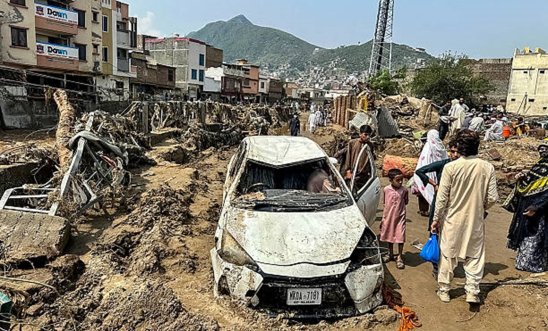
Pakistan’s Flood of Floods: Climate Crisis and Human Rights (Part 2)

Written by Irfan Ali, Country Coordinator for Pakistan
Humanitarian suffering: Flood survivors in Sindh tell Amnesty International they were given only tents by officials, with no medicine or clean water. Many drank stagnant floodwater, and children and the elderly went without care.
The human toll of these failures is a matter of basic rights. Inadequate housing, water and healthcare turn natural disasters into human tragedies. Amnesty International has documented how Pakistan’s poor and marginalized suffer disproportionately. After the 2024 Sindh floods, Amnesty found thousands of displaced families living in tents with rampant disease and hunger, describing how “tens of thousands of people have been abandoned by the Sindh government”. One father told: “We were drinking flood water. The government provided us a tent, and nothing else”. Many told researchers they simply could not afford to move to safety. Most had at least one family member sick with malaria, skin infections or diarrhoea from the floods according to Amnesty International. Women and children were especially vulnerable. Girls had to relieve themselves only at night to avoid exposure, and mothers described watching infants suffer prolonged coughing or vomiting with no clinic in reach. UNICEF reported over 230,000 children saw their schooling disrupted by flood damage. Even prior to the latest deluge, some villages remain unrepaired from 2022 an ongoing indignity for survivors.
Lives upended: After repeated floods, survivors despair of rebuilding. One father from Badin, Sindh, lost his crops and stored wheat, and asked tearfully, “Why should I build it again and again if the floods will come again in a year?”. Despite government promises to fund reconstruction, many families say they have received no support beyond a one-time food parcel. Those with money can relocate to higher ground, but poor families are often stranded in flood-prone zones.
Indeed, Amnesty notes that the state has repeatedly failed to guarantee basic economic and social rights in the wake of these disasters. The government did not ensure access to adequate healthcare, food and housing after recent floods and heatwaves. The results have been high mortality and sickness often unseen in official statistics especially among the very young and very old. In 2025 Amnesty published a major report concluding “Pakistan’s healthcare and disaster response systems are failing to meet the needs of children and older people who are most at risk”. In plain terms the most vulnerable are literally paying with their lives for the country’s weak disaster planning.
This is also a human-rights issue of climate justice. Victims and activists argue that wealthy, polluting nations bear responsibility for the flooding that Pakistan suffers. Amnesty’s flood report explicitly reminded that the biggest emitters, “who bear most responsibility for climate change-related disasters, must minimise the harmful effects of climate change on human rights by phasing out fossil fuels as quickly as possible”. Pakistanis see their suffering as a moral issue: as Pakistan’s climate minister Musadiq Malik put it, “I don’t look at this as a crisis of climate. I look at this as a crisis of justice.. We are paying for it through these erratic climate changes, floods, [and] devastation”.
Pakistan faces a flood of floods driven by a changing climate, yet it lacks the governance and resources to stop the cycle. The poor suffer first and worst when cyclones and cloudbursts strike. As residents say: without credible warnings, reliable infrastructure or adequate relief, basic survival becomes a luxury. We urge the government of Pakistan to recognise that radical environmental reforms are no longer optional, they are a matter of survival. Flooding and climate devastation cannot and must not be normalised. Every washed-away home, every child without medicine, every family left in tents is proof of a state that has failed its people. Pakistan’s rulers must invest in resilient defences, enforce environmental laws, and protect those most at risk. And the world must not turn away: climate justice demands urgent financing and support for adaptation. Until then, ordinary Pakistanis will continue to inherit nothing but repression from their state and devastation from the climate.
Our blogs are written by Amnesty International staff, volunteers and other interested individuals, to encourage debate around human rights issues. They do not necessarily represent the views of Amnesty International.
0 comments